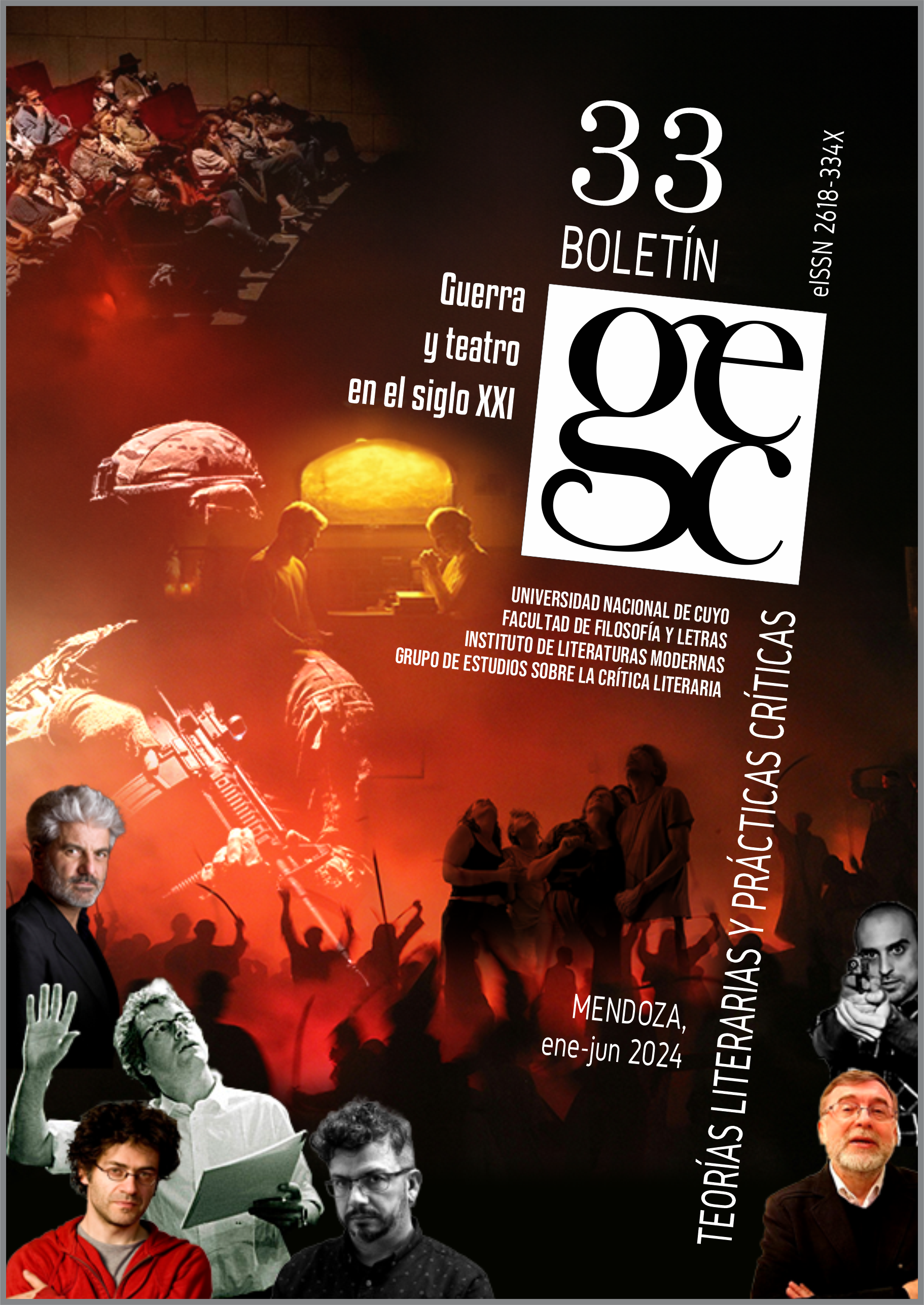Po-ethics of war in the dramatics works of Matei Vişniec, Laurent Gaudé and Wajdi Mouawad: The theatre as a battlefield
DOI:
https://doi.org/10.48162/rev.43.052Keywords:
geography of war, playwriting, counter-narrative, testimonyAbstract
To raise the question of war is to raise the question of narrative. What is offered here is a reflection on the “narration” of war(s) in the dramatics works of Matei Vişniec, Laurent Gaudé and Wajdi Mouawad, in an attempt to highlight the characteristics and singularities of anti-heroic “narratives” that develop from a double perspective, from an oscillatory movement between actualisation and “essentialization”, history and myth, fragmentation and linkage, synchrony and diachrony, plurality and unity. The texts seem to elaborate a sort of po-ethics of war that subsumes oppositions and paradoxes in an effort to apprehend History in its catastrophic dimension, privileging the sense of the human and affirming the superiority of the word.
References
Adorno, T. W. (1998). Educación para la emancipación: Conferencias y conversaciones con Hellmut Becker (1959-1969) (Trad. J. Muñoz). Ediciones Morata.
Apollinaire, G. (1918). Calligrammes. Poèmes de la paix et de la guerre (1913-1916). Mercure de France.
Becker, A. (2000). George Mosse, de la grande guerre au totalitarisme: La brutalisation des sociétés européennes [compte rendu]. Annales. Histoire, Sciences sociales, 55(1), 181-182. https://www.persee.fr/doc/ahess_0395-2649_2000_num_55_1_279837_t1_0181_0000_3
Bechara, S. (2000). Résistante. J.C. Lattès.
Cristian, G. (2017, junio). L’insoutenable légèreté de la mémoire et de l’oubli chez Matei Vişniec. 20èmes Rencontres des jeunes chercheurs en Sciences du Langage. Paris, France. https://univ-sorbonne-nouvelle.hal.science/hal-02013295/document.
Eco, U. (2009). Vertige de la liste (Trad. M. Bouzaher). Flammarion.
Gaudé, L. (2001). Pluie de cendres. Actes Sud-Papiers.
Gaudé, L. (2012). Caillasses. Actes Sud-Papiers.
Gaudé, L. (2018). Cendres sur les mains. Actes Sud-Papiers. (Original publicado en 2002).
Gaudé, L. (2022). Les sacrifiées. Actes Sud-Papiers. (Original publicado en 2004).
Godin, D. (1999). Mémorandum: La femme comme champ de bataille. Jeu. Revue de Théâtre, 91(2), 167-170. https://www.erudit.org/fr/revues/jeu/1999-n91-jeu1074049/25764ac/
Guerrin, M. (2019, 30 de agosto). Le “Monde d’hier” de Stefan Zweig résonne avec le monde d’aujourd’hui. Le Monde. https://www.lemonde.fr/idees/article/2019/08/30/le-monde-d-hier-de-stefan-zweig-resonne-avec-le-monde-d-aujourd-hui_5504305_3232.html.
Guidicelli, C. (2009). Au seuil du texte, le chœur: une voix fondatrice qui s’efface. Réflexion sur l’œuvre dramatique de Laurent Gaudé. HAL. Open Science. https://univ-montpellier3-paul-valery.hal.science/hal-03807062/document
Herreras, E. (2022). Del teatro del absurdo al teatro de la perplejidad (pasando por la Posmodernidad). En I. Marcillas y B. Sansano (Eds.), Del teatre de l’absurd als nous paradigmes performatius (pp. 17-40). Punctum.
Kucharuk, S. (2022a). Matei Vişniec-À la croisée de deux cultures. Romanica Cracoviensia, 22(Special Issue), 489-497. https://doi.org/10.4467/20843917RC.22.045.16699
Kucharuk, S. (2022b). La mort contrariée dans l’œuvre dramatique de Matei Vişniec. Anagnórisis. Revista de investigación teatral, (25), 127-140. https://dialnet.unirioja.es/servlet/articulo?codigo=8504896
Lambert, J. (2005). On les disait terroristes sous l’occupation du Liban-Sud. Sémaphore.
Lescot, D. (2001). Dramaturgies de la guerre. Circé.
Loscot-Lena, M. (2011). “Rien n’est plus drôle que le malheur”: Du comique et de la douleur dans les écritures dramatiques contemporaines. Presses Universitaires de Rennes.
Mouawad, W., Archambault, H. y Baudriller, V. (2009a). Voyage pour le festival d’Avignon 2009. P.O.L.
Mouawad, W. (2009b). Le sang des promesses/1. Littoral. Leméac / Actes Sud-Papiers. (Original publicado en 1999).
Mouawad, W. (epílogo de Farcet, Ch.). (2009c). Le sang des promesses/2. Incendies. Leméac / Actes Sud-Papiers. (Original publicado en 2003).
Mouawad, W. (2011). Incendios (Trad. e int. Eladio de Pablo). KRK Ediciones.
Mouawad, W. (2009d). Le sang des promesses/3. Forêts. Leméac / Actes Sud-Papiers. (Original publicado en 2006).
Mouawad, W. (2009e). Le sang des promesses/4. Ciels. Leméac / Actes Sud-Papiers.
Mouawad, W. (2013). Cielos (Trad. e int. Eladio de Pablo). KRK Ediciones.
Rabinovitch, G. (2021, 15 de marzo). Entretien avec Gérard Rabinovitch: Leçons de la Shoah / Entrevistado por C. Guimonnet. Association des Professeurs d’Histoire et de Géographie. https://www.aphg.fr/Entretien-avec-Gerard-Rabinovitch-Lecons-de-la-Shoah
Sarrazac, J-P (2011). Le témoin et le rhapsode ou le retour du conteur. Études théâtrales, (51-52), 11-25. https://www.cairn.info/revue-etudes-theatrales-2011-2-page-11.htm
Steiner, G. (1969). Langage et silence (Trad. Lucienne Lotringer). Seuil. (Original publicado en 1967).
Vernant, J.P. (1989). L’individu, la mort, l’amour: Soi-même et l’autre en Grèce ancienne. Gallimard.
Vişniec, M. (2011). La littérature comme champ de bataille dans la langue de Matei Vişniec / Entrevistado por N. N. Sayegh. Agenda Culturel. Recuperado el 10 de noviembre de 2023. https://www.agendaculturel.com/article/La_litterature_comme_champ_de_bataille_dans_la_langue_de_Matei_Visniec
Vişniec, M. (1997). La femme comme champ de bataille ou Du sexe de la femme comme champ de bataille dans la guerre en Bosnie. Actes Sud-Papiers.
Vişniec, M. (2007). Le mot progrès dans la bouche de ma mère sonnait terriblement faux. Lansman.
Vişniec, M. (2013). La palabra progresa en boca de mi madre sonaba tremendamente falsa (Trad. e Introducción E. Miñano). Universitat de València.
Vişniec, M. (2017). Le retour à la maison. Visniec.com. https://www.visniec.com/pages/PDF/LE%20RETOUR%20A%20LA%20MAISON.pdf
Vişniec, M. (2018). Pourquoi Hécube. Non Lieu.
Vişniec, M. (2020a). La mémoire des serpillères. L’Œil du Prince.
Vişniec, M. (2020b). Occident-Express. Non Lieu.
Weil, S. (1999). Œuvres. Gallimard.
Downloads
Published
How to Cite
Issue
Section
License
Copyright (c) 2024 Fabienne Crastes

This work is licensed under a Creative Commons Attribution-NonCommercial-NoDerivatives 4.0 International License.
Aquellos autores/as que tengan publicaciones en esta revista, aceptan los términos siguientes:
- Los autores/as conservarán sus derechos de autor y garantizarán a la revista el derecho de primera publicación de su obra, el cual estará simultáneamente sujeto a la Licencia de reconocimiento de Creative Commons que permite a terceros compartir la obra siempre que no se use para fines comerciales, siempre que se indique su autor y su primera publicación en esta revista, y siempre que se mencionen la existencia y las especificaciones de esta licencia de uso.
- Los autores/as podrán adoptar otros acuerdos de licencia no exclusiva de distribución de la versión de la obra publicada (p. ej.: depositarla en un archivo telemático institucional o publicarla en un volumen monográfico) siempre que se indique la publicación inicial en esta revista y se cumplan las otras condiciones mencionadas arriba.
- Se permite y recomienda a los autores/as difundir su obra a través de Internet (p. ej.: en archivos telemáticos institucionales o en su página web) antes y durante el proceso de envío, lo cual puede producir intercambios interesantes y aumentar las citas de la obra publicada. (Véase El efecto del acceso abierto).














